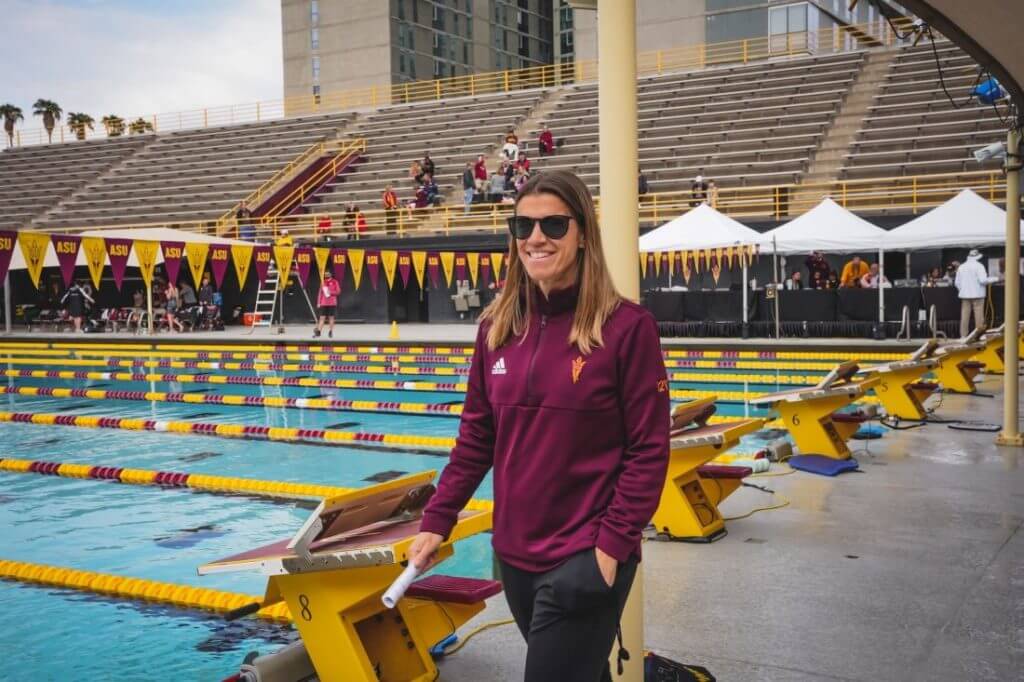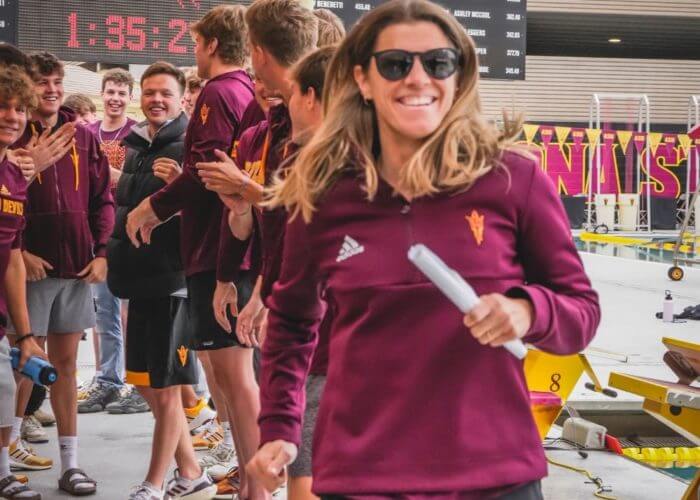Q&A: Checking In With Rachel Stratton-Mills, Arizona State Associate Head Coach

Q&A: Checking In With Rachel Stratton-Mills, Arizona State Associate Head Coach
Lia Neal was among the first of Rachel Stratton-Mills’ Olympians. Now as associate head coach at Arizona State, she is mentoring multiple international-class athletes as the Sun Devils continue their NCAA ascension.
Rachel Stratton-Mills
Associate Head Coach
Arizona State Swimming
Tempe, Arizona
• UCLA, B.A., sociology, 2002; M.A., liberal studies, Arizona State University, 2022
• Chairman, Bruin Athletic Council, 2000-02
• Associate head coach, Arizona State University, 2017-present
• Coach, DC Trident, 2019
• Head coach, Asphalt Green Unified Aquatics, 2010-15
• Assistant Coach, University of Maryland, 2008-10
• Assistant Coach, Dartmouth College, 2006-08
• Head coach, Santa Monica Swim Team, 2002-06
• Coach, West Valley Swim Club, 1997-2000
• Coach, USA National Team for Short Course Worlds, 2012
• Coach, USA National Junior World Championship, 2011
• Coach, National Select Camp, 2008
• Chairman, Pacific Section, Southern California Swimming, 2005-06
• Member, USA Swimming Rules/Regulations Committee
• Member, USA Swimming’s Women Coaches in Governance Program
• ASCA Certificate of Excellence recipient, 2010-12
Q. SWIMMING WORLD: You came to swimming in your mid-teens. What did you do earlier?
A. COACH RACHEL STRATTON-MILLS: I played many different sports—soccer, tennis and softball. I played tennis at a local club, but to be excused from PE classes, you needed to participate in at least two high school sports. Tennis counted, but I had to pick another. The school was starting a water polo team, which sounded like fun…and it was! Being left-handed, I was an asset to the team, but a pretty lousy swimmer. The water polo coach suggested I join a local swim club to improve my swimming and endurance. I did, and I immediately fell in love with the sport. I never looked back.
SW: And why West Valley JC for swimming and then UCLA?
RSM: By the time I started swimming seriously, I was already halfway through my junior high school year. I received scholarship offers to play water polo at a few universities, but my heart was in swimming. To do so in college, I needed more time in the sport. I stayed home one more year, attended West Valley and continued to train and develop as a swimmer. I chose UCLA because my teammate/best friend was being recruited by them. I sort of tagged along with my friend’s recruiting process and was given an opportunity to join the team.
SW: What was it like swimming for Cyndi Gallagher?
RSM: In my first year at UCLA, it was very intimidating. I had been a competitive swimmer for a little more than two years and still had so much to learn. But I was always eager to work hard and really enjoyed being challenged every day.
SW: Is it fair to say Cyndi was an early mentor?
RSM: Absolutely. Actress Elizabeth Marvel said, “If you can see it, you can be it.” I didn’t really understand at the time how important that was, but I now know how much being led by a female head coach in college helped me believe in the possibility of my own career path. Even more so, it was a female who was also a mother, and that has influenced me immensely as I navigate life as a mother and collegiate swim coach.
SW: After Team Santa Monica, Maryland and Dartmouth, you helped grow Asphalt Green significantly. How?
RSM: When I arrived at Asphalt Green, there were already successful swimmers at the age group level…and many who weren’t. So, I felt my job was to keep fostering those already having success, such as Lia Neal and Annie Zhu, while finding a way to engage with those who needed a different path to reach their goals. New York City is an interesting place to coach because there is such a wide range of socio-economic, cultural backgrounds and languages spoken. Asphalt Green was really a microcosm of the whole city. One training style and one way to communicate won’t get the job done in that environment, so it was exciting to find a way to connect with each athlete in a way that made sense to them.

Photo Courtesy: Arizona State University
SW: After leaving AGUA, you traveled the USA for 15 months, visiting club and college programs. How did that tour come about?
RSM: This trip was my husband’s dream. His business, GoSwim, is an online educational resource for swimming techniques. He always wanted to see how teams were teaching technique around the country. At first I first thought it was crazy, but then I thought this would be a great opportunity for me to learn various coaching styles and training methodologies. So, we sold pretty much everything, bought a 35-foot RV and off we went. Our daughter, Maddy, was 1-1/2 at the time, so the trip did have its share of challenges…like potty training a 2-year-old while living in an RV. Sabbaticals aren’t typical in the competitive swimming world, and most people do not get opportunities to spend 15 months simply learning in our industry. We made the most of it, visited over 60 teams and had an amazing experience overall.
SW: What was the impetus to settle with Bob Bowman’s program in Tempe?
RSM: The timing was perfect. I was at the end of this sabbatical and looking forward to the next opportunity. Bob had a position open, and our paths had crossed numerous times in the past, including a team visit to ASU. The draw was what keeps me motivated each day, being surrounded by Bob and the other coaches, who are incredibly dedicated to the sport and constantly finding ways to improve and pursue excellence.
SW: You were a sprinter. Currently, you primarily coach women in 50-100-200 events, often giving individual workouts to each swimmer. What else is different from the training you did as a swimmer?
RSM: A lot. The biggest difference for the 50-100-200 women is incorporating more training at race pace and working at different percentages of each athlete’s 100%. Aerobic work—I did lots—is just one part of a plan that works to target all energy systems throughout the training block. Another big focus is on the legs. Kick work, on a board, off a board and underwaters is one of the most important things we do within our weekly plan.
SW: In the last several years, your recruiting among women has really paid off. How does expanding the women’s roster to almost 30% with international athletes help?
RSM: The first step was seeking like-minded individuals. We look for those striving for excellence in the pool, the classroom and with passion for the sport. This type of athlete can be found worldwide, so we try not to limit ourselves domestically. This focus has created a tremendous program foundation. Each year the level of the recruiting classes has gotten stronger, all with the underlying characteristics that make for a cohesive and positive team.
SW: College and pro swimmers in the same workouts: What’s the value?
RSM: Anytime the top swimmers in the world are in practice, it elevates everyone. This is especially true at ASU. Collegians can learn from the pros’ maturity and an ability to navigate the challenges of being an elite athlete. And they learn from the high level the pros bring to daily practice. When one is surrounded by incredibly hard-working, fast swimmers day-in and day-out, the practice elevates to a much higher level.
SW: You have been a team captain and are big on leadership. How do you find leadership opportunities for your swimmers?
RSM: I want all the women on this team to feel like they have a voice. And each Lady Devil, whether elected captain or not, can lead those around them in various ways. This is a challenge. I find that many young women come out of high school without the confidence to use their voices in a strong, yet positive manner. So, I work on finding small, daily ways to encourage this with our athletes. If every team member uses her voice to move one another toward team goals, then there is no limit to what we can achieve.
SW: ASU took a self-mandated redshirt year during COVID. What were the positives?
RSM: The decision to redshirt was made with many unknowns about the virus. The motivation was pretty simple: Protect our athletes. If someone was sick, we wanted the priority to be to get well and not feel the need to rush back into the pool to preserve the season. We know much more now, but at the time, we felt this was the best way to keep our athletes safe, both physically and mentally.
SW: …and the negatives?
RSM: Athletes missed out on a year of competition. That did set a few athletes back, especially the ones who were just learning to compete at an elite level. There is no substitute for race experience, so we are still catching up on that with a few of our women.
SW: You believe in strong women in and out of the pool and are associated with USA Swimming’s Women Coaches in Governance Program. Now 18 months into the program, are you encouraged by the committee’s progress?
RSM: Any time USA Swimming works toward increasing and supporting women in coaching and governance, I feel encouraged. That said, there is always more work to do. With more people tracking on how to have more representation, I’m very optimistic for the future.
SW: Closer to home, why do you insist on heating up your tuna and cabbage lunch in the coach’s office microwave?
RSM: SOME people have commented on how delicious this meal smells post-microwaving—not many, but once someone did. It might have been someone else’s lunch they were referring to, now that I think about it.
SW: Your daughter, Maddy, just landed a leading role in her school musical. How have you transitioned into being a stage mother?
RSM: The good news for Maddy is that I know nothing about singing. I let my mother-in-law take the lead in helping her prepare for the upcoming show. Also, the practices are closed to parents. Maddy is probably pretty happy about that!
* * *
Michael J. Stott is an ASCA Level 5 coach, golf and swimming writer. His critically acclaimed coming-of-age golf novel, “Too Much Loft,” is in its second printing, and is available from store.Bookbaby.com, Amazon, B&N and distributors worldwide.




Excellent and informative interview! Watch out! the Lady Devils are developing into a swimming power!
So no tough questions? #puffpiece